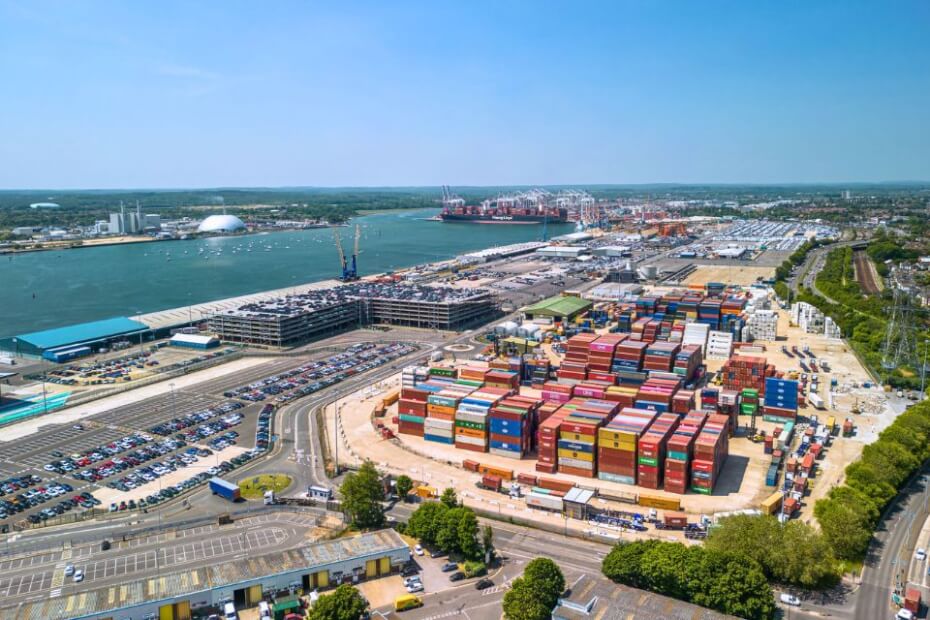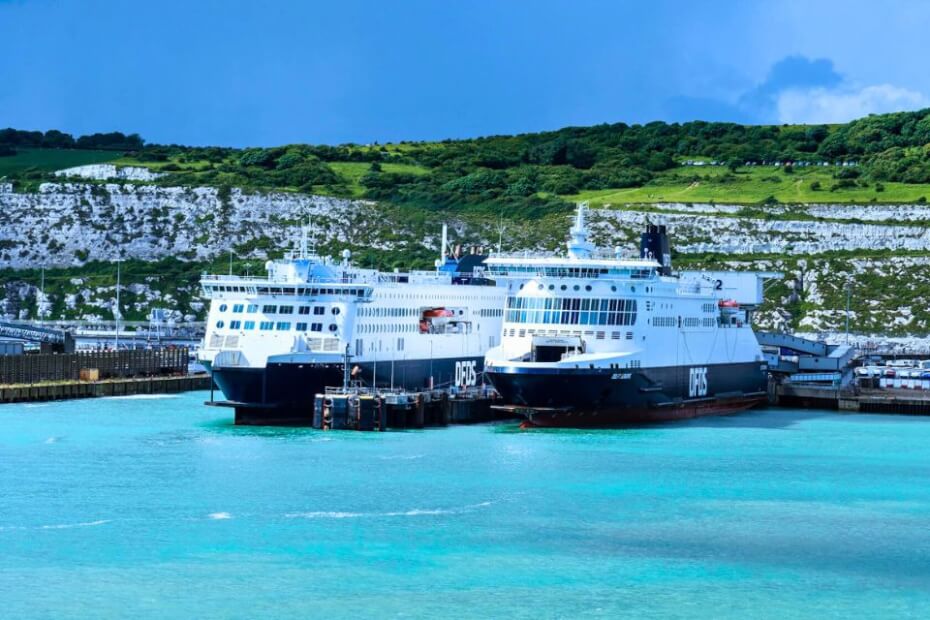
Most visitors to the United Kingdom (UK) arrive by air. Still, arriving via UK seaports offers a unique and flexible way to explore this beautiful country. With its extensive network of ports and ferry connections, the UK allows travelers to enjoy scenic journeys.
There are regular ferry services from the Republic of Ireland to the British mainland and crossings by hovercraft and boat to and from France, the Netherlands, and Spain.
Whether planning a short trip, a motoring holiday, or a cruise, this article can guide travelers through UK seaports, popular routes, and how the new UK Electronic Travel Authorization (ETA) affects sea travel.
Why consider traveling via UK seaports?
While sea travel is not for everyone, below are the advantages it offers:
- Bring Your Own Vehicle: Travelers can bring their car or camper, perfect for road trips and exploring the UK at their own pace. It also lets travelers avoid the limitations of public transportation.
- More Luggage Flexibility: Ferries often allow travelers to carry more baggage than airlines. There is no limit to the amount of baggage you can carry, either by hand or in the vehicle.
- Relaxed Experience: Ferries also provide a more relaxed travel experience with onboard amenities like comfortable lounges, dining options, and the chance to enjoy the open sea.
- Shorter Immigration Lines: Ferry terminals often have less congestion than airports, making sea travel more convenient for many.
- More environmentally friendly. For environmentally conscious travelers, ferries can offer a lower carbon footprint per passenger than flights, especially on shorter routes.
Conversely, travelers must consider some downsides of sea travel:
- Longer Travel Times: Some ferry routes can take significantly longer than flights.
- Weather Delays: Rough seas can lead to cancellations or extended journeys.
- Limited Accessibility: Smaller ports may not have strong public transport links.
Main UK seaports
The UK has a vast network of ports, many of which serve as gateways for travelers from Europe and beyond. Below are some of the most essential passenger ports:
Dover
Dover is one of the busiest roll-on/roll-off passenger ports globally, handling over 16 million travelers annually. It is located on England’s southeastern coast and offers frequent ferry crossings to Calais and Dunkirk in France.
With 38 daily crossings to Calais, the journey takes about 90 minutes, making it an ideal option for quick trips between the UK and France.
Portsmouth
Located 75 miles south of London, Portsmouth is a hub for ferry routes to France, Spain, and the Channel Islands. Popular destinations include Cherbourg, Caen, Le Havre, and St. Malo in France, as well as Santander and Bilbao in Spain.
Newhaven
A smaller port in East Sussex, Newhaven connects with Dieppe in Normandy, France. This route operates three times daily and takes approximately four hours, offering a quieter alternative to busier ports.
Plymouth
Plymouth is situated in southwest England and offers routes to Roscoff in France and Santander in Spain. The trip to Roscoff takes about 5.5 hours. On the other hand, the journey to Santander lasts around 20 hours, perfect for travelers embarking on long-distance adventures.
Liverpool
Liverpool is a gateway to the Republic of Ireland and beyond on the west coast. Its ferry routes connect with Dublin and other key locations. Liverpool also hosts a cruise terminal, making it a significant departure point for luxury cruises.
Harwich
Located in eastern England, Harwich connects the UK to the Netherlands via routes like Hoek van Holland, which is just a short trip from Rotterdam and Amsterdam.
Popular ferry routes serviced by UK Seaports

Ferry travel is a flexible way to explore the UK and nearby European destinations. Below are some of the most popular routes:
Ireland – UK
- Dublin to Holyhead: The Republic of Ireland is only a short distance from the UK mainland. There are multiple regular passenger and car ferry crossings between Holyhead (on the Welsh Isle of Anglesey) and the Irish capital city of Dublin. Stena Line operates this route.
- Rosslare to Fishguard: Another Stena Line route connects southern Ireland in Rosslare (95 miles/152 km south of Dublin) to Wales, where train and bus connections are available to many major cities in England.
- Dublin to Liverpool: Operated by P&O Ferries, this route offers more direct access to England, with sailings once or twice daily.
France – UK
France is the most popular European destination for UK ferry travelers. Key routes include:
- Dover to Calais/Dunkirk: Short crossings ideal for day trips.
- Portsmouth to Caen/Cherbourg/Le Havre: Perfect for Normandy or Brittany exploration.
- Plymouth to Roscoff: A scenic route to northwestern France.
- Newhaven to Dieppe
- Poole to Cherbourg
Netherlands – UK
- Harwich to Hoek van Holland: This route is perfect for visitors heading to the Netherlands. Harwich is 86 miles (138 km) east of London and Hoek van Holland is approximately 54 miles (87 km) southwest of Amsterdam, a mere 17 miles (27 km) from Rotterdam.
- Hull to Rotterdam
- Newcastle to Amsterdam
Spain – UK
- Portsmouth to Santander/Bilbao: Great for travelers planning a road trip in Spain.
- Plymouth to Santander
UK seaports’ cruise options
The UK is also a hub for cruise travel, with several major ports offering luxury voyages to destinations like the Mediterranean, the Baltic, and even Greenland. Key cruise ports include:
Southampton
On top of being the second-biggest container port in the UK, Southampton is also a center of activity for cruise ships and a base for well-known liners like the Queen Elizabeth, Queen Victoria, and Queen Mary. This port offers trips to various destinations, from Europe to the Caribbean.
Liverpool
The port of Liverpool on the west coast of England has its own cruise ship terminal building right in the heart of the city. This makes it convenient for passengers to explore before or after their journey. Top cruise ship operators operate from the city, including Fred Olson and Cruise Maritime Voyages.
Dover
Dover isn’t just for ferries or cargo; it is also a home port for the Fred Olson Cruise Line, Windstar Cruises, Crystal Cruises, and the Norwegian Cruise Line.
Tilbury
The Fred Olson Cruise Line operates regular departures from the port of Tilbury at the mouth of the River Thames. Cruises from Tilbury are bound for destinations in Northern Europe, Greenland, Norway, and even the Arctic.
Harwich
An hour by train from London, the port of Harwich is relatively tiny compared to others. Still, it is a port of call for cruise ship operators Fred Olson (a local company) and Royal Caribbean and Marella Cruises.
How the new UK ETA affects UK sea travel

As is the case when arriving at an airport, travelers must also have the required travel documentation when using UK seaports. Passports and visas will be checked before boarding a ship, but further checks at different seaport entry points are also likely.
This now includes the new ETA system for UK non-visa travelers. The ETA is a digital permit that allows visitors to enter the UK for short stays. Visa-exempt travelers must apply for pre-travel authorization before their UK trip.
Starting 8 January 2025, all visa-exempt non-European UK visitors must have an ETA before their journey. Applications open for European nationals on 5 March 2025 for travels to the UK on and after 2 April 2025.
The ETA application process is straightforward and entirely online via the UK Government website or the UK ETA mobile app.
Applicants must submit personal and passport details and contact information, answer security questions, and pay the £10 application fee.
Processing typically takes three days, but there may be cases where it would take longer. For this reason, travelers are advised to apply well before their intended travel to avoid delays.
The ETA will be electronically linked to travelers’ passports. It will be valid for two years unless the passport linked to it expires earlier. During this period, ETA holders can travel to the UK multiple times for short stays or up to six months per visit.
Visa-required travelers and those denied an ETA must apply for a UK visa to visit England. The same applies to those planning to work, study for more than six months, and live in the UK. The UK ETA scheme does not affect the UK visa application system.

